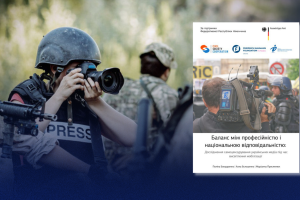
The results of the 2018 USAID/ENGAGE Anti-Corruption Poll demonstrate that 36.4% of Ukrainians are ready to join some form of organized action against corruption. Respondents give the biggest support (12.6%) to reporting to the mass media or making statements in social media to reveal dishonest civil servant behavior. Every 10th citizen reported readiness to participate in meetings and public protests, support anti-corruption NGOs, sign local petitions or report corruption cases to law enforcement bodies. The actual level of anti-corruption engagement reported by respondents is 11.5%, which means there is a potential for increasing anti-corruption citizen engagement. Individuals whose families have personally experienced corruption over the past 12 months show more readiness to join anti-corruption actions than the general public (45.6%.)
While corruption continues to be perceived as among Ukraine’s top three problems, citizens regard political corruption of the highest echelons to be the most serious problem: When rating the importance of different types of corruption, 92.5% of respondents regarded it as a very serious or rather serious issue. Everyday corruption that respondents themselves may encounter in their daily lives is seen as a less serious problem (81.6% of respondents named it a very serious or rather serious problem). Corruption in business is estimated as very or rather serious by 72.4% of respondents.
While the general perception of the corruption level did not change much since 2015, people’s certainty about corrupt authorities has increased significantly over the past three years. The Rada, President and Cabinet of Ministers all deemed more corrupt – by a percentage points increase of 12 to 20 compared to 2015. Moreover, citizens see a lack of willingness to tackle the issue by these institutions of national governance. Instead, on the government side, people see the greatest willingness to overcome corruption in new specialized anti-corruption bodies (16% of respondents see good intentions of the National Anti-Corruption Bureau of Ukraine, the National Agency on Corruption Prevention and the Specialized Anti-Corruption Prosecutor’s Office). On the non-government side, numbers are much higher: A lot of respondents see a willingness to overcome corruption among ordinary people (72.7%), mass media (47.3%) and NGOs (41.9%). In contrast, the barriers to people’s participation in anti-corruption activities is lack of trust in achieving positive changes in the situation through such actions (71.8% of respondents), lack of guarantees protecting personal safety of participants (70.9%), distrust in the government handling anti-corruption (deterring 68.3% of people) and two thirds (66.4%) reported the lack information about civic actions against corruption.
This executive summary provides an oversight of the key findings for Ukraine in relation to each of the broader research themes addressed in the survey.
The USAID/ENGAGE Anti-Corruption Poll was commissioned by Pact in the framework of the Enhance Non-Governmental Actors and Grassroots Engagement (ENGAGE) project of USAID, implemented by Pact[1]. This large-scale pan-Ukrainian survey of public opinion on corruption in Ukraine is aimed at monitoring perception of and experience with corruption in Ukraine since 2007. This research employed the methodology applied in similar periodical studies conducted between 2007 and 2015 under earlier USAID projects.
The survey was carried out in July–August 2018 and covered 10,169 respondents. The theoretical sample error of the survey is 1%. The sample formed for the survey is representative for the adult (aged 18 and older) population of Ukraine as a whole and for every oblast of Ukraine. The survey was conducted using random multistage sampling with quota selection at the last stage.
The Kyiv International Institute of Sociology conducted all fieldwork and data processing for the survey.
Overview of Findings
Changes in corruption perception
- Most Ukrainian residents are convinced that corruption is common in Ukrainian society: nearly two thirds (65.5%) think it is very common, 21.2% think it is rather common (giving it 4 out of 5 points), 9.2% say it is not very common (2-3 out of 5 points), and only 1.1% believe there is no corruption in Ukraine at all. Respondents’ evaluation of corruption levels remains the same as in 2015: From 1 to 5 (where 1 stands for ‘not common at all’ and 5 means ‘very common’), the general corruption prevalence was rated 4.52 and 4.53 in 2015 and 2018, respectively.
- People think that the most corrupt are the court system (62.2% believe it is very widespread there), health care services (rated as very corrupt by 55.0% of respondents), and the prosecutor’s office (54.3%). However, in respondents’ opinion, the level of corruption in everyday life has slightly decreased. Compared to 2015, there is a decrease in corruption perception indices of 13 out of 19 sectors, in particular, higher education (the proportion of people assessing it as very corrupt has gone down from 47% in 2015 to 38% in 2018), the prosecutor’s office (from 62.4% to 54.3%), tax services (from 47.2% to 41.6%), and real estate registrars (from 38.7% to 33.4%).
- Unlike corruption perception in sectors where citizens directly interact with the government, people’s conviction about corrupt authorities has increased significantly over the past three years: 73.2% are certain that corruption is very widespread in Verkhovna Rada (12.6 percentage points more than in 2015), 67.6% believe that corruption is very widespread in the Cabinet of Ministers (12.8 percentage points more than in 2015), and 66.1% say that the President and his Administration are very corrupt (19.7 percentage points more than in 2015).
Changes in corruption experiences
- According to respondents’ perception, 41.5% households have experienced corruption encounters over the past 12 months, where 30.6% reflects respondents’ personal experiences and 10.9% shows their family members’ experiences. Overall, 53.1% of respondents experienced no corruption. During 2011 survey, 60.1% of respondents mentioned that they or their family members faced corruption by the government (the list of alternatives in the 2015 survey was slightly different).
- People who most often experience corruption cases themselves are those aged 30 to 45, with higher levels of education and financial well-being.
- Overall, considering any forms of corruption (bribe extortion, voluntary bribing and the use of personal connections), respondents’ experiences show that the most corrupt sectors are higher education (some form of corruption was encountered by 61.8% of people who have dealt with it over the past 12 months), getting permissions from government authorities (corruption encounters happened to 56.7% of respondents when they tried to receive services there), licensing at automobile registration and traffic service centers (54.3%), health care services (53.2%), the judicial system (52.1%), seeking employment with state institutions (51.3%), and the National Police (51.3%). The lowest corruption incidence is in the sector related to applying for and receiving unemployment aid or other social benefits (15.1%).
- Compared to 2015, corruption experiences in different sectors remain nearly as common, with the exception of the health care sector, where we can trace a decrease in corruption behavior.
- In the long run, we can note growing corruption incidences in the judicial system, land privatization, ownership and use, real estate registration or privatization – due to increasing bribe requests in these sectors. At the same time, corruption is slightly decreasing in dealing with government authorities for business regulation, receiving state-subsidized housing, installation or repairs of utilities for communal services or connection, and applying for or receiving unemployment aid and other social benefits (including pensions, subsidies, etc.).
- Near-corruption practices in the health care system, which were assessed separately, continue to be high, but the is also cause for cautious optimism in comparison with previous years. The proportion of people who encountered corruption or corruption-related practices (buying medicines or medical instruments to visit a doctor; ‘donating’ to hospital/medical office funds; having to provide free services or make unofficial payments in hospitals or polyclinics) has decreased from 88.1% in 2015 to 79.2% in 2018.
Corruption as a policy issue
- Corruption is perceived as one of the top three concern of citizens. The vast majority (93.7%) of Ukrainians see it among the main problems of the country: 75.7% deem it to be very serious and 18% view it as rather serious issue. Citizens put high living costs combined with low salaries (95.8%) and worries about the military conflict in the east of Ukraine (93.9%) amongst the three key problems.
- When rating the importance of different corruption types, 73.2% of respondents regarded the highest level political corruption to be a very serious issue and 19.3% took it as rather serious (92.5% in total). Everyday corruption that respondents themselves may encounter in their daily lives is seen as a less serious problem (53.3% of respondents named it a very serious problem and 28.3% said it was rather serious; 81.6% in total). Corruption in business is estimated as very serious by 47.4% of respondents and rated as rather serious by 25%.
- The majority of people think that a lack of adequate punishment for corruption (80.1% of respondents) and dishonesty of politicians and public officials (58.1%) are the causes of corruption. People’s habit of solving issues in corrupt ways was mentioned as a cause by 39.6% of respondents.
- The majority of respondents consider punishment to be the most effective anti-corruption remedy: to guarantee inevitable criminal punishment for corruption (58.4% mentioned it among the first three options, of which 23.9% named it as the first choice), to abolish MP immunity in the Ukrainian parliament (56.2% mentioned it among the first three options, of which 29.0% named it as the first choice) and to lay off civil servants with a further ban on holding a similar public office (53.0% mentioned it among the first three options, of which 12.2% named it as the first choice).
Attitudes to government and non-government actors
- Ukrainians still place the greatest responsibility for combating corruption on the national government institutions. Most respondents believe the President (63.0%), Verkhovna Rada (41.7%) and the Cabinet of Ministers of Ukraine (37.7%) to be mainly responsible for addressing corruption in the country.
- The share of people who place responsibility for anti-corruption actions on the public is 10.6% (in the preceding research rounds, it grew from 15.8% in 2007 to 18% in 2011 and 24% in 2015). The highest levels of civil responsibility are characteristic of younger age groups (under 45) and people who have attended higher education.
- Very few people see a willingness to address corruption by the national government: 6% see it in the President of Ukraine, 4.9% in the Cabinet of Ministers and 4.1% in Verkhovna Rada. Though this number did not exceed 12% even in 2015, figures for each of the highest bodies of power have shown a statistically significant decrease. Instead, on the government side, people see the greatest willingness to overcome corruption in new specialized anti-corruption bodies (16% of respondents see good intentions of the National Anti-Corruption Bureau of Ukraine, the National Agency on Corruption Prevention and the Specialized Anti-Corruption Prosecutor’s Office). On the non-government side, numbers are much higher: A lot of respondents see a willingness to overcome corruption among ordinary people (72.7%), mass media (47.3%) and NGOs (41.9%). Willingness among the business community to overcome corruption was mentioned by 22.5% of respondents.
Fighting against corruption
- Less than half of respondents (46.8%) believe that public influence can help decrease corruption in the country. Another 9.8% are convinced that the one thing people can do is abstain from offering and giving bribes to civil servants. And 34.8% believe that the public has no influence on corruption levels in the country.
- Readiness to join organized anti-corruption actions is stated by 36.4% of respondents. Respondents give the biggest support (12.6%) to reporting to mass media or making statements in social media to reveal dishonest civil servant behavior. Individuals whose families have personally encountered corruption over the past 12 months show more readiness to join actions aimed at curbing corruption (any of those suggested in the survey) than the general public, and the difference is statistically significant.
- Feeling that such activity directly concerns themselves or their family (69.3%) and guaranteed safety (61.5%) are the most motivating factors when it comes to participating in counter-corruption actions. Another important factor is perceived collectivism: Compassion to corruption victims can motivate 56.8% of respondents, and another 54.1% are ready to join their relatives or friends in such actions.
- The most essential barriers to people’s participation in anti-corruption activities is a lack of trust in positive changes to the situation through such actions (demotivating 71.8% of respondents), a lack of guarantees of personal safety for participants (70.9%), distrust in the government handling anti-corruption (deterring 68.3% of people). 66.4% are not informed of how to join.
- Anti-corruption experience was confirmed by 11.5% of respondents. The prevailing activities are statements revealing corruption encounters made in the media and on social networks – just as in the question about efficiency of public action against corruption and people’s readiness to join it (4.2%). Anti-corruption activism involving petitions to the government is also becoming a rather popular civil activity tool, used by 3.6% of respondents during the year preceding the survey.
This press-release was prepared by Pact as part of the USAID/ENGAGE activity, which is funded by the United States Agency for International Development (USAID). The content of this press-release is the sole responsibility of Pact and its implementing partners and does not necessary reflect the views of USAID or the United States Government.
[1]The purpose of USAID/ENGAGE is to increase citizen awareness of and engagement in civic activities at the national, regional, and local levels.








